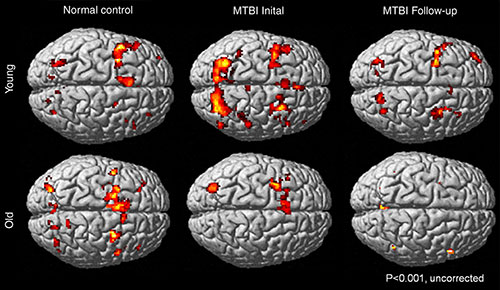Older Patients Recover More Slowly from Concussion
Functional MR imaging (fMRI) showed different activation patterns during working memory (WM) performance tasks in younger and older patients, confirming the importance of age in the activation, modulation and allocation of WM processing resources after mild traumatic brain injury (MTBI), according to new Radiology research.
David Yen-Ting Chen, M.D., of the Brain and Consciousness Research Center in Taiwan, and colleagues assessed N-back WM cerebral activation with fMRI in 13 younger (mean age, 26.2 years ± 2.9; range, 21–30 years) and 13 older (mean age, 57.8 years ± 6.6; range, 51–68 years) patients with MTBI and 26 age- and sex-matched control subjects. Two fMRI were obtained within one month after injury and six weeks after the initial study. Group comparison and regression analysis were performed among postconcussion symptoms, neuropsychologic tests, and WM activity in both groups.
In addition to showing different activation patterns during WM tasks in younger and older patients, the study also found:
- Partial recovery of a decrease of post-concussion syndrome (PCS) symptoms associated with hyperactivation was observed in younger patients at six-week follow-up imaging, whereas persistent hypoactivation and no change in PCS symptoms were observed in older patients.
- Increased activation in younger patients was associated with poorer task performance and more severe PCS symptoms; surprisingly, the latter may suggest that hyperactivation in younger patients with MTBI indicates more severe brain injury.
“Taken together, these findings provide evidence for differential neural plasticity across different ages, with potential prognostic and therapeutic implications,” the authors write.

Web Extras
- Access the study, “Effect of Age on Working Memory Performance and Cerebral Activation after Mild Traumatic Brain Injury: A Functional MR Imaging Study,” at pubs.rsna.org/doi/full/10.1148/radiol.2015150612